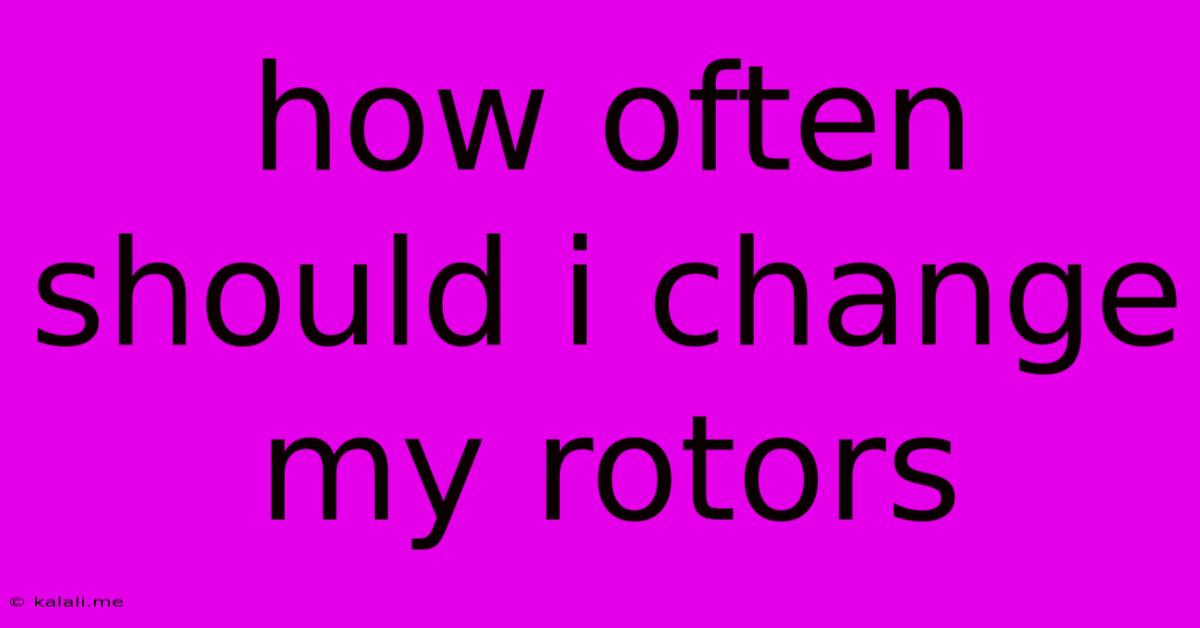How Often Should I Change My Rotors
Kalali
Jun 01, 2025 · 3 min read

Table of Contents
How Often Should You Change Your Rotors? A Comprehensive Guide
Knowing when to replace your brake rotors is crucial for maintaining safe and effective braking performance. Ignoring worn rotors can lead to reduced braking power, increased stopping distances, and even dangerous brake failure. This guide will help you understand the signs of worn rotors and determine how often they need replacing. It also covers factors influencing rotor lifespan and what to expect during replacement.
Understanding Brake Rotor Wear
Brake rotors are critical components of your braking system. They're the metal discs that your brake pads grip to slow or stop your vehicle. Over time, constant friction from braking causes them to wear down. This wear manifests in several ways:
- Grooving: Deep grooves or scoring on the rotor surface indicate significant wear. This reduces the contact area between the pad and rotor, leading to less effective braking.
- Excessive Thickness Variation (TV): Uneven wear across the rotor's surface, resulting in thickness variations, can cause vibration or pulsation in the brake pedal.
- Rust and Corrosion: While surface rust is often superficial, heavy corrosion can weaken the rotor and compromise its structural integrity.
- Warping: Overheating can warp the rotor, leading to the same pulsating brake pedal feel as excessive TV.
- Visible Scoring or Damage: Deep scratches or gouges on the rotor’s surface indicate potential damage that needs professional attention.
How Often Should You Replace Brake Rotors?
There's no single definitive answer to how often you should replace your brake rotors. It depends on several factors including:
- Driving Habits: Aggressive braking, frequent hard stops, and heavy loads put significantly more wear and tear on your rotors.
- Vehicle Type and Weight: Heavier vehicles tend to wear rotors faster due to increased braking force.
- Driving Conditions: Frequent mountain driving or driving in harsh weather conditions can accelerate rotor wear.
- Brake Pad Material: Different brake pad materials have varying effects on rotor wear. Some materials are more abrasive than others.
- Rotor Material: The material of the rotor itself affects its lifespan. Higher-quality materials can offer increased durability.
Signs Your Brake Rotors Need Replacing:
While regular inspections are recommended, pay close attention to these signs:
- Brake Pedal Pulsation: A pulsating or vibrating brake pedal is often a strong indicator of warped or unevenly worn rotors.
- Reduced Braking Performance: If you notice a longer stopping distance or a less responsive brake pedal, it's time to check your rotors.
- Unusual Noises: Grinding, squeaking, or squealing noises while braking could be a sign of worn or damaged rotors.
- Visible Wear: Inspect your rotors regularly. Look for deep grooves, scoring, excessive rust, or warping.
Professional Inspection is Key:
While you can visually inspect your rotors, a professional mechanic can perform a thorough inspection including measuring rotor thickness and assessing for uneven wear or warping. They can accurately determine if replacement is necessary.
Conclusion:
The lifespan of your brake rotors varies greatly depending on several factors. While there's no set mileage or timeframe for replacement, regular inspections and attention to warning signs are crucial for maintaining safe braking performance. Err on the side of caution – replacing worn rotors is far less costly than dealing with brake failure or an accident. Remember, your safety is paramount.
Latest Posts
Latest Posts
-
Kirby And The Forgetton Land Coins
Jun 03, 2025
-
Why Was John The Baptist In Prison
Jun 03, 2025
-
Can I Download A Single Tab In Google Sheets
Jun 03, 2025
-
How To Get Rid Of Fingerprints
Jun 03, 2025
-
Calories In Cup Of Uncooked Rice
Jun 03, 2025
Related Post
Thank you for visiting our website which covers about How Often Should I Change My Rotors . We hope the information provided has been useful to you. Feel free to contact us if you have any questions or need further assistance. See you next time and don't miss to bookmark.